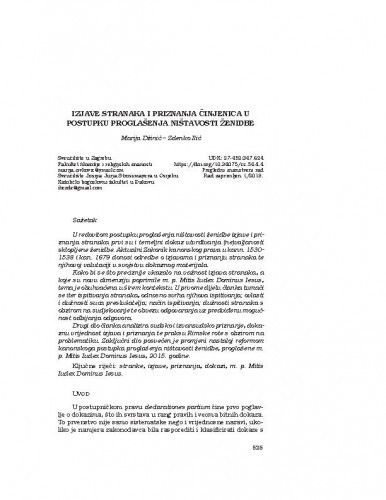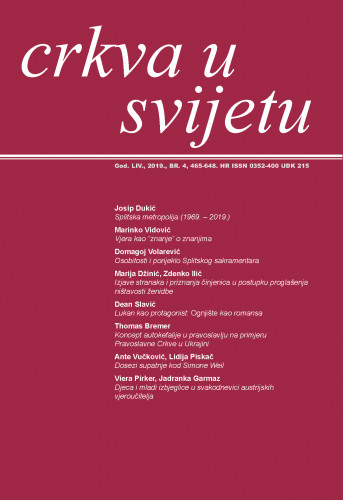U redovitom postupku proglašenja ništavosti ženidbe izjave i priznanja stranaka prvi su i temeljni dokaz utvrđivanja (ne)valjanosti sklopljene ženidbe. Aktualni Zakonik kanonskog prava u kann. 1530-1538 i kan. 1679 donosi odredbe o izjavama i priznanju stranaka te njihovoj valutaciji u svojstvu dokaznog materijala. Kako bi se što preciznije ukazalo na važnost izjava stranaka, a koje su novu dimenziju poprimile m. p. Mitis Iudex Dominus Iesus, tema je obuhvaćena u širem kontekstu. U prvome dijelu članka tumači se iter ispitivanja stranaka, odnosno svrha njihova ispitivanja; ovlasti i dužnosti suca preslušatelja; način ispitivanja; dužnosti stranaka s obzirom na sudjelovanje te obvezu odgovaranja uz predviđenu mogućnost odbijanja odgovora. Drugi dio članka analizira sudsko i izvansudsko priznanje, dokaznu vrijednost izjava i priznanja te praksu Rimske rote s obzirom na problematiku. Zaključni dio posvećen je promjeni nastaloj reformom kanonskoga postupka proglašenja ništavosti ženidbe, proglašene m. p. Mitis Iudex Dominus Iesus, 2015. godine.; In the ordinary contentious trial of the annulment of the marriage, confessions and declarations of the parties are the centre point of determination of validity of marriage. The Canon Law of 1983, in the cc. 1530-1538 describes the canonical norms about the declarations of the parties. The first part of the article analyses an iter of the interrogation of the parties: the purpose of the interrogation; the judge’s authority and obligations; the mode of asking questions during the trial; obligations of parties to respond to the questions; refusal of parties to respond to the questions. The second part considers different types of the interrogation of the parties as judicial and extra-judicial confession, a probative force of their confessions and declarations together and a short retrospection on the practice of Roman Rote and how the Supreme Court of the Catholic Church values the content of the answers during the canonical proceeding of the annulment of the marriage. The final part of the article analyses the changes introduced with m.p. Mitis Iudex Dominus Iesus thanks to which a judicial confession and the declarations of the parties, possibly supported by witnesses to the credibility of the parties, can have the force of full proof to be evaluated by the judge, unless other elements that weaken them are present.
Sažetak

 Crkva u svijetu : 54,4(2019) / glavni i odgovorni urednik, editor-in-chief Mladen Parlov.
Crkva u svijetu : 54,4(2019) / glavni i odgovorni urednik, editor-in-chief Mladen Parlov.